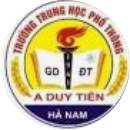11. Many songs (sing) ______________________________ on the New Year’s Eve.

Những câu hỏi liên quan
A. Fill in the gap with the correct names.1. ______________ is going to a street party in Scotland.2. ______________ is going to sing on New Year’s Eve.3. ______________ will be in a foreign country on New Year’s Eve.4. ______________ isn’t going to make any New Year’s resolutions.5. ______________ wants to learn to play a musical instrument.6. ______________ wants to have a healthier diet.B. Decide if the statements are true (T) or false (F).1. New Year’s resolutions often involve...
Đọc tiếp
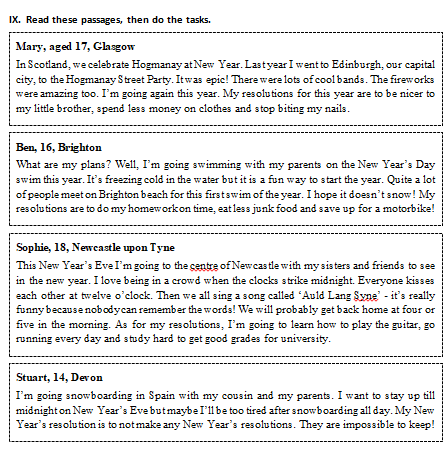
A. Fill in the gap with the correct names.
1. ______________ is going to a street party in Scotland.
2. ______________ is going to sing on New Year’s Eve.
3. ______________ will be in a foreign country on New Year’s Eve.
4. ______________ isn’t going to make any New Year’s resolutions.
5. ______________ wants to learn to play a musical instrument.
6. ______________ wants to have a healthier diet.
B. Decide if the statements are true (T) or false (F).
1. New Year’s resolutions often involve health and money.
2. People usually celebrate Hogmanay at New Year in England.
3. There are no fireworks for Hogmanay.
4. It’s traditional to go swimming in Brighton on New Year’s Eve.
5. People sing a song called ‘Auld Lang Syne’ at midnight on New Year’s Eve.
6. Most British people know all the words to ‘Auld Lang Syne’.
A. Fill in the gap with the correct names.1. ______________ is going to a street party in Scotland.2. ______________ is going to sing on New Year’s Eve.3. ______________ will be in a foreign country on New Year’s Eve.4. ______________ isn’t going to make any New Year’s resolutions.5. ______________ wants to learn to play a musical instrument.6. ______________ wants to have a healthier diet.B. Decide if the statements are true (T) or false (F).1. New Year’s resolutions often involve...
Đọc tiếp
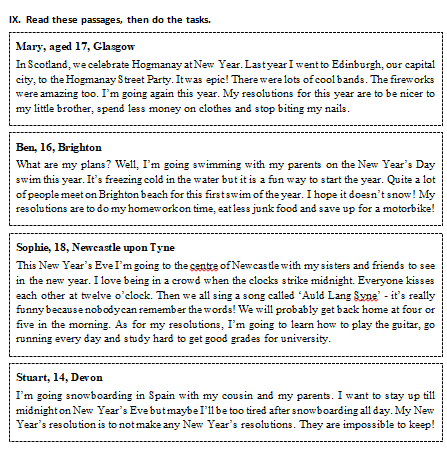
A. Fill in the gap with the correct names.
1. ______________ is going to a street party in Scotland.
2. ______________ is going to sing on New Year’s Eve.
3. ______________ will be in a foreign country on New Year’s Eve.
4. ______________ isn’t going to make any New Year’s resolutions.
5. ______________ wants to learn to play a musical instrument.
6. ______________ wants to have a healthier diet.
B. Decide if the statements are true (T) or false (F).
1. New Year’s resolutions often involve health and money.
2. People usually celebrate Hogmanay at New Year in England.
3. There are no fireworks for Hogmanay.
4. It’s traditional to go swimming in Brighton on New Year’s Eve.
5. People sing a song called ‘Auld Lang Syne’ at midnight on New Year’s Eve.
6. Most British people know all the words to ‘Auld Lang Syne’.
A. Fill in the gap with the correct names.1. ______________ is going to a street party in Scotland.2. ______________ is going to sing on New Year’s Eve.3. ______________ will be in a foreign country on New Year’s Eve.4. ______________ isn’t going to make any New Year’s resolutions.5. ______________ wants to learn to play a musical instrument.6. ______________ wants to have a healthier diet.B. Decide if the statements are true (T) or false (F).1. New Year’s resolutions often involve...
Đọc tiếp
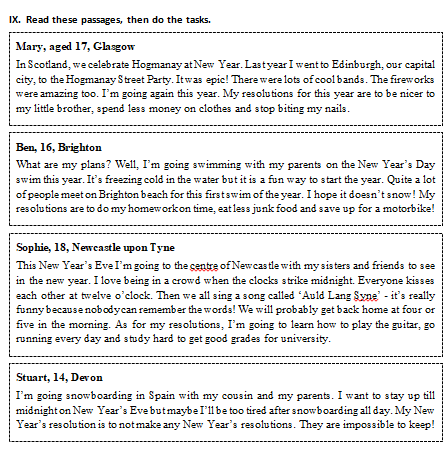
A. Fill in the gap with the correct names.
1. ______________ is going to a street party in Scotland.
2. ______________ is going to sing on New Year’s Eve.
3. ______________ will be in a foreign country on New Year’s Eve.
4. ______________ isn’t going to make any New Year’s resolutions.
5. ______________ wants to learn to play a musical instrument.
6. ______________ wants to have a healthier diet.
B. Decide if the statements are true (T) or false (F).
1. New Year’s resolutions often involve health and money.
2. People usually celebrate Hogmanay at New Year in England.
3. There are no fireworks for Hogmanay.
4. It’s traditional to go swimming in Brighton on New Year’s Eve.
5. People sing a song called ‘Auld Lang Syne’ at midnight on New Year’s Eve.
6. Most British people know all the words to ‘Auld Lang Syne’.
A. Fill in the gap with the correct names.1. ______________ is going to a street party in Scotland.2. ______________ is going to sing on New Year’s Eve.3. ______________ will be in a foreign country on New Year’s Eve.4. ______________ isn’t going to make any New Year’s resolutions.5. ______________ wants to learn to play a musical instrument.6. ______________ wants to have a healthier diet.B. Decide if the statements are true (T) or false (F).1. New Year’s resolutions often involve...
Đọc tiếp
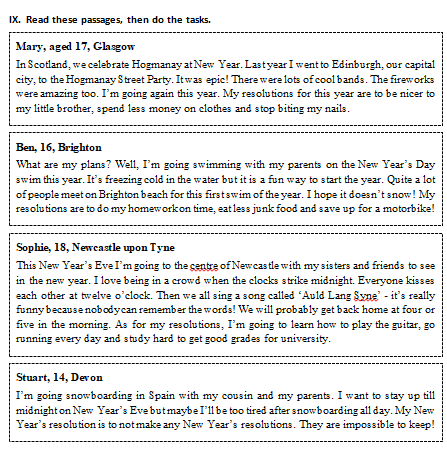
A. Fill in the gap with the correct names.
1. ______________ is going to a street party in Scotland.
2. ______________ is going to sing on New Year’s Eve.
3. ______________ will be in a foreign country on New Year’s Eve.
4. ______________ isn’t going to make any New Year’s resolutions.
5. ______________ wants to learn to play a musical instrument.
6. ______________ wants to have a healthier diet.
B. Decide if the statements are true (T) or false (F).
1. New Year’s resolutions often involve health and money.
2. People usually celebrate Hogmanay at New Year in England.
3. There are no fireworks for Hogmanay.
4. It’s traditional to go swimming in Brighton on New Year’s Eve.
5. People sing a song called ‘Auld Lang Syne’ at midnight on New Year’s Eve.
6. Most British people know all the words to ‘Auld Lang Syne’
A. Fill in the gap with the correct names.1. ______________ is going to a street party in Scotland.2. ______________ is going to sing on New Year’s Eve.3. ______________ will be in a foreign country on New Year’s Eve.4. ______________ isn’t going to make any New Year’s resolutions.5. ______________ wants to learn to play a musical instrument.6. ______________ wants to have a healthier diet.B. Decide if the statements are true (T) or false (F).1. New Year’s resolutions often involve...
Đọc tiếp
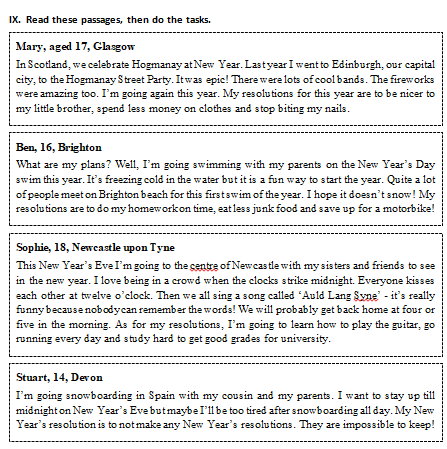
A. Fill in the gap with the correct names.
1. ______________ is going to a street party in Scotland.
2. ______________ is going to sing on New Year’s Eve.
3. ______________ will be in a foreign country on New Year’s Eve.
4. ______________ isn’t going to make any New Year’s resolutions.
5. ______________ wants to learn to play a musical instrument.
6. ______________ wants to have a healthier diet.
B. Decide if the statements are true (T) or false (F).
1. New Year’s resolutions often involve health and money.
2. People usually celebrate Hogmanay at New Year in England.
3. There are no fireworks for Hogmanay.
4. It’s traditional to go swimming in Brighton on New Year’s Eve.
5. People sing a song called ‘Auld Lang Syne’ at midnight on New Year’s Eve.
6. Most British people know all the words to ‘Auld Lang Syne’.
A. Fill in the gap with the correct names.1. ______________ is going to a street party in Scotland.2. ______________ is going to sing on New Year’s Eve.3. ______________ will be in a foreign country on New Year’s Eve.4. ______________ isn’t going to make any New Year’s resolutions.5. ______________ wants to learn to play a musical instrument.6. ______________ wants to have a healthier diet.B. Decide if the statements are true (T) or false (F).1. New Year’s resolutions often involve...
Đọc tiếp
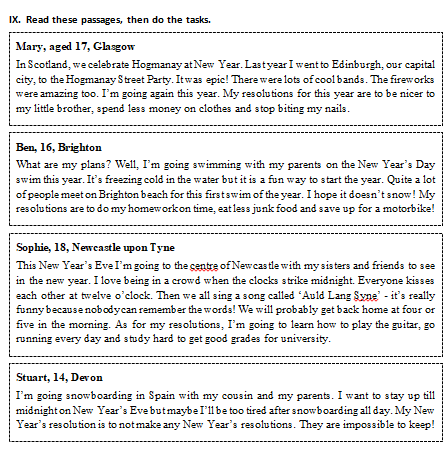
A. Fill in the gap with the correct names.
1. ______________ is going to a street party in Scotland.
2. ______________ is going to sing on New Year’s Eve.
3. ______________ will be in a foreign country on New Year’s Eve.
4. ______________ isn’t going to make any New Year’s resolutions.
5. ______________ wants to learn to play a musical instrument.
6. ______________ wants to have a healthier diet.
B. Decide if the statements are true (T) or false (F).
1. New Year’s resolutions often involve health and money.
2. People usually celebrate Hogmanay at New Year in England.
3. There are no fireworks for Hogmanay.
4. It’s traditional to go swimming in Brighton on New Year’s Eve.
5. People sing a song called ‘Auld Lang Syne’ at midnight on New Year’s Eve.
6. Most British people know all the words to ‘Auld Lang Syne’.
Chuyển các câu sau thành câu bị động:
1.We sing many songs on New Year's eve
2. Many students visited the Temple of Literature yesterday
Chuyển các câu sau thành câu bị động:
1.We sing many songs on New Year's eve
-> Many songs are sung on New Year's eve.
2. Many students visited the Temple of Literature yesterday
-> The Temple of Literature was visited by many students yesterday.
Đúng 3
Bình luận (1)
Đầu tiên bạn phải hiểu cách làm đã xong mới làm được nhé. Mình có công thức cho bạn đây!
S+be+P2+by+O( đây là cấu trúc cho câu thuộc thì hiện tại đơn và quá khứ đơn)
Trong đó: S là tân ngữ lúc đầu, O là chủ ngữ lúc đầu.
VD câu 1: We sing many songs on New Year's eve
Trước hết cần xác định thì của câu(câu trên là thì hiện tại đơn)
Trong câu trên, có:
We: chủ ngữ
sing: động từ
many songs on New Year's eve: tân ngữ
Ta biến tân ngữ thành chủ ngữ, chủ ngữ thành tân ngữ, động từ chuyển sang phân từ hai.
Ta chuyển thành câu bị động thì có câu:
Many songs on New Year's eve are sung by us.
Tương tự với câu 2 nhưng sẽ là ở thì quá khứ đơn nên ta có kết quả:
2. The temple of Literature was visited by many students.
P/s: Nếu cần công thức của thì hiện tại tiếp diễn và quá khứ tiếp diễn thì nhắn tin với mình nhé! Với cả mình là dân tiếng Anh nên có gì thì hỏi mình cũng được, nếu giúp được thì mình giúp cho.
~ Chúc bạn học tốt ~
Đúng 1
Bình luận (1)
Choose the best answer (A, B, C or D).1. In London people cheer and sing when the clock _______midnight on New Year’s Eve. A. gets B. strikes C. sees D. goes2. On new year’s day, children __________lucky money red envelope. A. get – in B. ask – on C. take –at D. have – with3. The Times Square Ball begins its fall__________millions of voices countdown the fin...
Đọc tiếp
Choose the best answer (A, B, C or D).
1. In London people cheer and sing when the clock _______midnight on New Year’s Eve.
A. gets B. strikes C. sees D. goes
2. On new year’s day, children __________lucky money red envelope.
A. get – in B. ask – on C. take –at D. have – with
3. The Times Square Ball begins its fall__________millions of voices countdown the final seconds of the year.
A. during B. because C. when D. throughout
4. Do you believe that the first footer __________us good or bad luck?
A. must take B. should bring C. can make D. can bring
5. Some Vietnamese people don’t eat shrimps __________New year’s day.
A. in B. on C. at D. during
6. We shouldn’t play music __________ after midnight.
A. careful B. loud C. right D. easy
7. At Tet, many people present rice to wish __________ enough food throughout the year.
A. in B. for C. at D. with
8. Students __________ copy their classmates’ work.
A. should B. shouldn’t C. must D. not
9. The American __________ a midnight kiss with someone they love.
A. share B. take C. bring D. celebrate
10. People in many countries in the world often wear their ________ clothes on the New Year Day.
A. tradition B. traditional C. ordinary D. summer
11. I wish you a __________ life and __________ health.
A. long – best B. big – good C. long – good D. happy – bad
12. I will __________ my lucky money in my piggy bank.
A. keep B. spend C. borrow D. give
13. We should help our mother __________ the table after the meal.
A. make B. to make C. clear D. to clearing
14. People in Laos __________ water over one another.
A. give B. throw C. take D. bring
15. On new year’s day, children in Korea make a __________to their parents or elders and wish them a long and healthy .
A. bow – live B. friend – lives C. bows – lives D. bow – life
16. Children should help their parents __________their house with flowers and pictures.
A. make B. do C. decorate D. play
17. New year’s Eve is a night when members of a family often get__________ .
A. together B. another C. other D. others
18. People believe that ________water over people will bring a lot of rain in the new year.
A. throw B. to throw C. throwing D. throws
19. January 1st is a day when people in Europe and America __________new year.
A. see B. remember C. celebrate D. spend
20. New year is one of four important __________in the United States.
A. parties B. events C. festivals D. celebration
1. In London people cheer and sing when the clock _______midnight on New Year’s Eve.
A. gets B. strikes C. sees D. goes
2. On new year’s day, children __________lucky money red envelope.
A. get – in B. ask – on C. take –at D. have – with
3. The Times Square Ball begins its fall__________millions of voices countdown the final seconds of the year.
A. during B. because C. when D. throughout
4. Do you believe that the first footer __________us good or bad luck?
A. must take B. should bring C. can make D. can bring
5. Some Vietnamese people don’t eat shrimps __________New year’s day.
A. in B. on C. at D. during
6. We shouldn’t play music __________ after midnight.
A. careful B. loud C. right D. easy
7. At Tet, many people present rice to wish __________ enough food throughout the year.
A. in B. for C. at D. with
8. Students __________ copy their classmates’ work.
A. should B. shouldn’t C. must D. not
9. The American __________ a midnight kiss with someone they love.
A. share B. take C. bring D. celebrate
10. People in many countries in the world often wear their ________ clothes on the New Year Day.
A. tradition B. traditional C. ordinary D. summer
Đúng 3
Bình luận (0)
11. I wish you a __________ life and __________ health.
A. long – best B. big – good C. long – good D. happy – bad
12. I will __________ my lucky money in my piggy bank.
A. keep B. spend C. borrow D. give
13. We should help our mother __________ the table after the meal.
A. make B. to make C. clear D. to clearing
14. People in Laos __________ water over one another.
A. give B. throw C. take D. bring
15. On new year’s day, children in Korea make a __________to their parents or elders and wish them a long and healthy .
A. bow – live B. friend – lives C. bows – lives D. bow – life
16. Children should help their parents __________their house with flowers and pictures.
A. make B. do C. decorate D. play
17. New year’s Eve is a night when members of a family often get__________ .
A. together B. another C. other D. others
18. People believe that ________water over people will bring a lot of rain in the new year.
A. throw B. to throw C. throwing D. throws
19. January 1st is a day when people in Europe and America __________new year.
A. see B. remember C. celebrate D. spend
20. New year is one of four important __________in the United States.
A. parties B. events C. festivals D. celebration
Đúng 0
Bình luận (0)
Choose the best answer (A, B, C or D).
1. In London people cheer and sing when the clock _______midnight on New Year’s Eve.
A. gets B. strikes C. sees D. goes
2. On new year’s day, children __________lucky money red envelope.
A. get – in B. ask – on C. take –at D. have – with
3. The Times Square Ball begins its fall__________millions of voices countdown the final seconds of the year.
A. during B. because C. when D. throughout
4. Do you believe that the first footer __________us good or bad luck?
A. must take B. should bring C. can make D. can bring
5. Some Vietnamese people don’t eat shrimps __________New year’s day.
A. in B. on C. at D. during
6. We shouldn’t play music __________ after midnight.
A. careful B. loud C. right D. easy
7. At Tet, many people present rice to wish __________ enough food throughout the year.
A. in B. for C. at D. with
8. Students __________ copy their classmates’ work.
A. should B. shouldn’t C. must D. not
9. The American __________ a midnight kiss with someone they love.
A. share B. take C. bring D. celebrate
10. People in many countries in the world often wear their ________ clothes on the New Year Day.
A. tradition B. traditional C. ordinary D. summer
11. I wish you a __________ life and __________ health.
A. long – best B. big – good C. long – good D. happy – bad
12. I will __________ my lucky money in my piggy bank.
A. keep B. spend C. borrow D. give
13. We should help our mother __________ the table after the meal.
A. make B. to make C. clear D. to clearing
14. People in Laos __________ water over one another.
A. give B. throw C. take D. bring
15. On new year’s day, children in Korea make a __________to their parents or elders and wish them a long and healthy .
A. bow – live B. friend – lives C. bows – lives D. bow – life
16. Children should help their parents __________their house with flowers and pictures.
A. make B. do C. decorate D. play
17. New year’s Eve is a night when members of a family often get__________ .
A. together B. another C. other D. others
18. People believe that ________water over people will bring a lot of rain in the new year.
A. throw B. to throw C. throwing D. throws
19. January 1st is a day when people in Europe and America __________new year.
A. see B. remember C. celebrate D. spend
20. New year is one of four important __________in the United States.
A. parties B. events C. festivals D. celebration
Đúng 0
Bình luận (0)
They _______ the play on New Year’s Eve as they went to the Countdown Party 2018.
A. won’t have seen
B. wouldn’t have seen
C. needn’t have seen
D. can’t have seen
Đáp án D.
Tạm dịch: Họ chắc hẳn đã không xem vở kịch đêm giao thừa vì lúc đó họ đã đi xem Lễ Hội đếm ngược chào Xuân 2018.
Can’t have done something được sử dụng để đưa ra suy đoán chắc chắn đến 99% cho hành động xảy ra trong quá khứ.
Ex: Tom can’t have written this because it is in French and he doesn’t know French: Không có khả năng nào là Tom viết cái này cả vì cái này viết bằng tiếng Pháp mà Tom thì có biết tiếng Pháp đâu.
Đúng 0
Bình luận (0)







